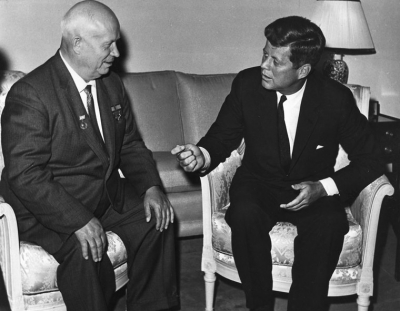The Berlin Crisis of 1961 (German: Berlin-Krise) occurred between 4 June 9 November 1961, and was the last major European politico-military incident of the Cold War about the occupational status of the German capital city, Berlin, and of postWorld War II Germany. The Berlin Crisis started when the USSR issued an ultimatum demanding the withdrawal of all armed forces from Berlin, including the Western armed forces in West Berlin. The crisis culminated in the city's de facto partition with the East German erection of the Berlin Wall.
The 22nd Congress of the Communist Party of the Soviet Unionthe last to be attended by the Chinese Communist Partywas held in Moscow during the crisis.
The Vienna summit was a summit meeting held on June 4, 1961, in Vienna, Austria, between President John F. Kennedy of the United States and First Secretary Nikita Khrushchev of the Soviet Union. The leaders of the two superpowers of the Cold War era discussed numerous issues in the relationship between their countries.
The summit took place five days after the assassination of President of the Dominican Republic Rafael Trujillo.

1961Jun, 4
In the Vienna summit, the Soviet premier Nikita Khrushchev sparks the Berlin Crisis by threatening to sign a separate peace treaty with East Germany and ending American, British and French access to East Berlin.
Choose Another Date
Events on 1961
- 8Jan
Charles de Gaulle
In France a referendum supports Charles de Gaulle's policies in Algeria. - 16Apr
Fidel Castro
In a nationally broadcast speech, Cuban leader Fidel Castro declares that he is a Marxist-Leninist and that Cuba is going to adopt Communism. - 1May
Fidel Castro
The Prime Minister of Cuba, Fidel Castro, proclaims Cuba a socialist nation and abolishes elections. - 25Jul
NATO
In a speech John F. Kennedy emphasizes that any attack on Berlin is an attack on NATO. - 10Aug
Agent Orange
First use in Vietnam War of the Agent Orange by the U.S. Army.

 English
English  español
español  français
français  português
português  русский
русский  العربية
العربية  简体中文
简体中文 